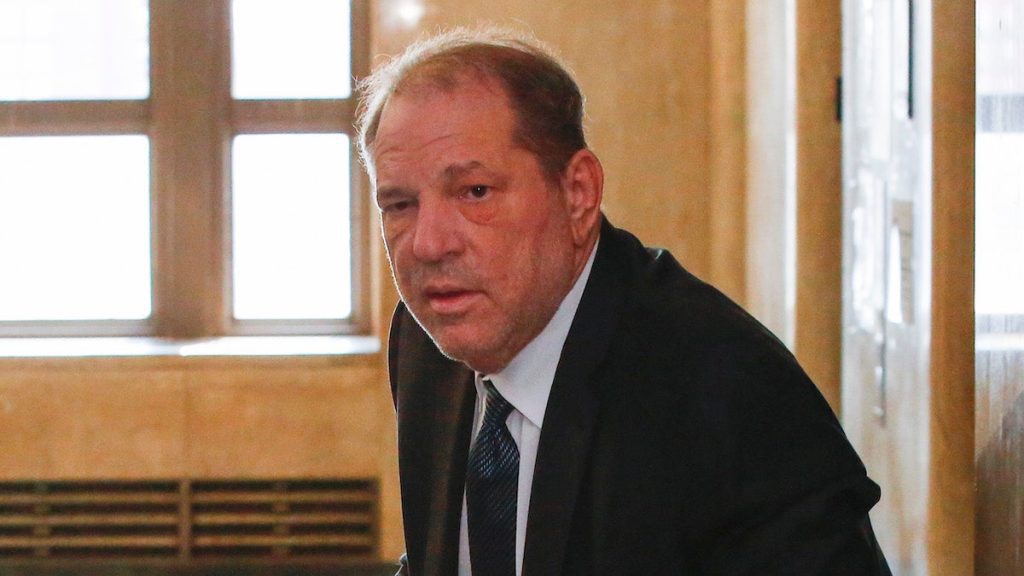The highest court in New York has cancelled Harvey Weinstein’s 2020 conviction for serious sexual offenses. on Thursday, marking a significant change in the most widely known case of the #MeToo movement. The New York State Court of Appeals found that the trial judge in Weinstein’s case made a mistake by allowing information about uncharged previous sexual acts, which may have unfairly influenced the jury due to not being part of the formal charges against him.
In addition to the New York conviction, Weinstein has also been convicted for the 2013 sexual assault and rape of an Italian model in California, where he received a 16-year prison sentence.
Weinstein, who is now 71, served roughly four years of his initial 23-year prison term in upstate Rome, New York. The Manhattan District Attorney, Alvin Bragg, is responsible for deciding whether to retry the case. While there is a possibility that Weinstein may not face a new trial in New York, he will not be freed due to his prior conviction in California.
In addition to this, the Manhattan District Attorney is currently prosecuting former President Donald Trump in a case related to hush money. In the February 2020 New York conviction, Weinstein was found guilty of third-degree rape of Jessica Mann and a criminal sexual act against actress Miriam Haley. He was also found not guilty of two other serious charges. The juror who had written a novel about older predatory men and the inclusion of witnesses testifying to prior bad acts were cited as factors affecting Weinstein's ability to have a fair trial, according to his appeal in 2021.
Weinstein has faced accusations from over 100 women, with the trial specifically focusing on the claims of Mann, Haley, and Sciorra. However, the testimony of three other women — costume designer Dawn Dunning, model Tarale Wulff, and model Lauren Young — was influential in overturning the conviction..
Judge Jenny Rivera of the New York Court of Appeals pointed out that everyone accused of a crime is constitutionally presumed innocent and deserves a fair trial and the chance to defend themselves.
He Rivera emphasized that the accused have the right to be held accountable only for the crime charged, and allegations of prior bad acts should not be admitted against them to establish their criminal tendencies.She noted that while prior convictions could be used to question the accused's credibility, introducing testimony about uncharged alleged prior sexual acts that were unrelated to Weinstein's charges was unfair.
Rivera also highlighted that the court's decision to allow the defendant, who had no criminal history, to be cross-examined about those allegations and numerous other misconduct claims was a further error that had a prejudicial impact. Weinstein has been accused by more than 100 women, but the trial focused on the accusations of just Mann, Haley, and Sciorra. It was the testimony from three other women — costume designer Dawn Dunning, model Tarale Wulff, and model Lauren Young — that led to the conviction being overturned.
Judge Jenny Rivera of the New York Court of Appeals remarked in the decision that the presumption of innocence is a fundamental aspect of a fair trial in the criminal justice system. She continued by stating that the accused have the right to be held accountable only for the crime charged, and therefore, allegations of prior bad acts should not be admitted to establish their propensity for criminal behavior. Furthermore, Rivera pointed out that prior convictions could be used to question the accused's credibility, but the testimony detailing uncharged alleged prior sexual acts against women not involved in the charges against Weinstein was prejudicial.
She further emphasized that the accused have the right to be held accountable only for the crime charged, and allegations of prior bad acts should not be admitted to establish their propensity for criminal behavior.
Rivera highlighted that while prior convictions could be used to question the accused's credibility, the testimony about uncharged alleged prior sexual acts against women not involved in the charges against Weinstein was unfair.
Rivera stated that the court's decision to allow the defendant, who had no criminal history, to be cross-examined about those allegations and numerous other misconduct claims was a further error that had a prejudicial impact.
harmless.”
The only proof against Weinstein was the testimony, the 4-3 decision stated, and the trial judge's ruling allowing the testimony about uncharged accusations supported the credibility of the women and served to "reduce defendant's character before the jury," the decision explains.
Rivera rejected arguments from disagreeing judges that the ruling would mean a "step backwards from recent advances in our understanding of how sex crimes are perpetrated and why victims sometimes respond in seemingly counterintuitive ways," and that the majority "shuts its eyes to the enduring effect of rape culture on notions of consent, and intent."
"On the contrary, consistent with our judicial role, our analysis is based on fundamental principles of evidence and the defendant's constitutional right to the presumption of innocence and a fair trial," Rivera wrote.
The right way to dispel misconceptions about rape is to educate the jury with testimony from experts, she added.
The decision continued, "justice for sexual assault victims is not incompatible with well-established rules of evidence designed to ensure that criminal convictions result only from the illegal conduct charged. Indeed, just as rape myths may impact the trier of fact's deliberative process, propensity evidence has a bias-inducing effect on jurors and tends to undermine the truth-seeking function of trials."
Rivera also dismissed claims by the prosecutor that "the unusual nature of the entertainment industry" and Weinstein's stature in it required the additional witnesses, maintaining that the "perverse quid pro quo," of superiors imposing unwanted sexual relations on subordinates at work is not unique to the "casting couch," but rather a "history reality" for women across the workplace.



